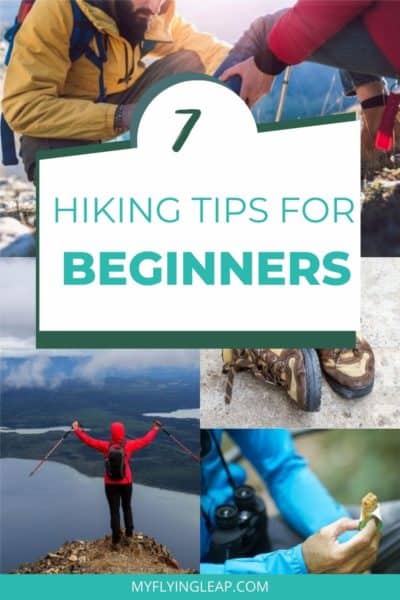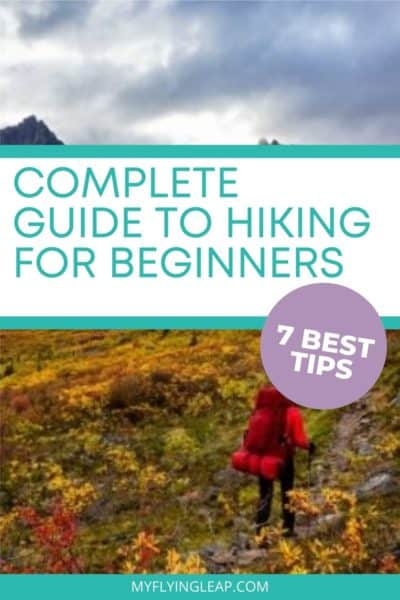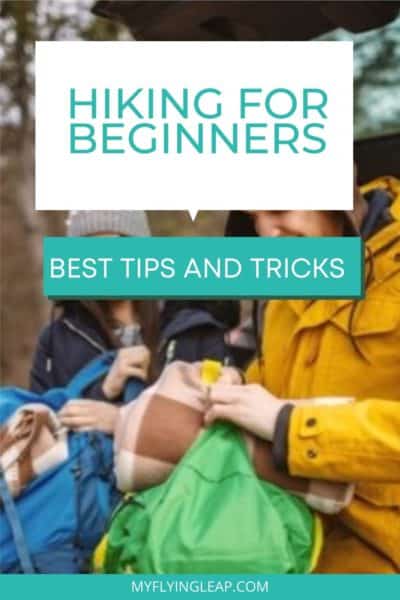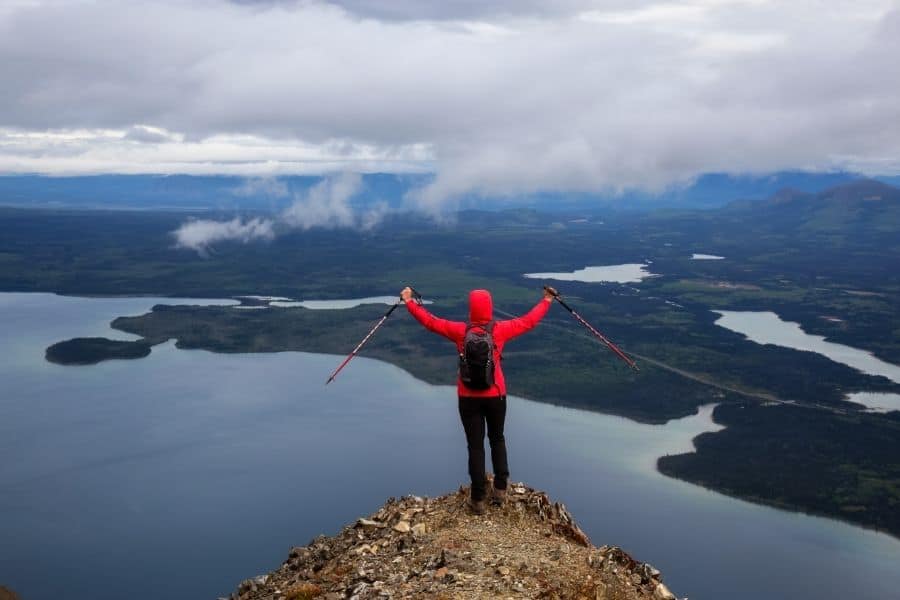Hiking for Beginners: 7 Essential Hiking Tips for New Hikers
Hiking is a great way to keep fit and active. Unlike spending hours in the gym or in front of the TV doing home workout videos, it allows you to explore natural scenery around your city or state.
An added bonus is you get more exercise when hiking—hiking only one or two miles will burn more calories than a mile on the treadmill. Unlike working out on a treadmill, it’s pretty hard to get bored with hiking with so many trails and areas to explore.
If you’re new to hiking, you might be a little lost when it comes to choosing the right trail or the right gear to bring. This complete guide to hiking for beginners will cover all the basics so you’re confident and ready to get on the trail or go to the national parks for the first time.
Ready to start hiking? Use this guide as your complete hiking guide for beginners!
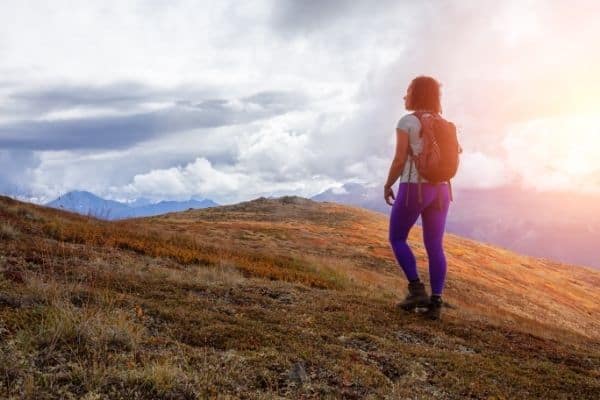
This post may contain affiliate links, which means I’ll receive a commission if you purchase through my links at no extra cost to you. Please read the full disclosure for more information.
Top 7 Tips: Hiking for Beginners
There are a lot of great tips for hiking for beginners. Here are the best hiking tips to help you get started that you won’t want to miss.
Always Plan Ahead
Planning ahead is an important step for hiking for all levels, but especially hiking for beginners.
Pack your daypack the night before to make sure you don’t forget anything important. If you’re packing right before you’re heading out on the trail, you’re more likely to forget something.
Also, check the weather and plan to go on a day with good weather. Hiking in the rain makes it much easier to slip or get stuck in the mud. So, try and go on a sunny and dry day when you’re first starting out.
Heavily trafficked trails are usually fun to hike solo since there will always be people around if you need help. If you’re not comfortable hiking alone, you can also plan ahead to hike with a group of friends.
If you want to go on a more isolated trail, consider bringing a friend or pet to keep you company. When you’re hiking solo, always let someone know where you are when you’re first starting out and check in when you’re home.
Most of the beginner hiking trails are more populated though so you shouldn’t have to worry about isolated trails when you are just starting out.

Bring All the Right Things in Your Daypack
We will go over how to buy proper gear later on, but you always need to throw a few things into your daypack when hiking to make sure you’re well prepared.
Some hiking essentials for beginners include:
- Water
- High-protein and high-carb snacks
- Sunscreen
- Bug spray
- Sunglasses
- Baseball hat or sun hat
- Basic first aid kit
- Flashlight or headlamp
- Rain jacket
- Paper map of the trail or a trail app on your phone for a digital map
- Solar charger for your phone (for longer hikes)
- Treats and snacks for your pet if you’re bringing them along
These things to bring hiking are for simple day hikes. If you’re camping or doing multiple-day hikes, you will need to bring a larger backpack and more gear.
As a beginner hiker, though, it’s a good idea to do a few day hikes before doing full-day or overnight trips.
Bring Enough Water and Food
Some people make the mistake of only bringing along one or two small bottles of water. When hiking, you need to be drinking about 1 liter of water for every 2 hours of activity. Bring a reusable insulated water bottle to keep your water colder for longer, especially in hot weather.
Depending on the trail, you might be able to refill along the way at water stations. Most trails don’t have a place for water, though, and you will need to bring enough to keep you hydrated.
You also need to bring enough food for your hike. Choosing high-protein and high-carb snacks will keep you fueled for longer. Most hikers bring along some dried fruit, jerky, and healthy granola bars.
Try to stay away from sugary breakfast bars or food that will go bad in the heat. This is a great hiking-for-beginners tip that you might not think about.
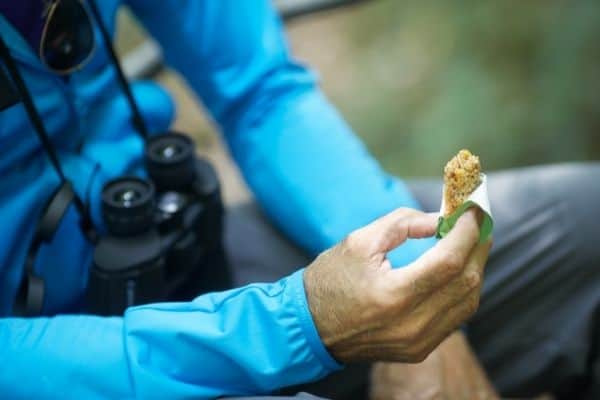
Choose the Right Trail
Choosing the right trail will ensure you don’t get overwhelmed or push yourself too hard.
When you are researching trails, try to read reviews from other hikers. See what they say about the difficulty and elevation gain. You can also use AllTrails to find in-depth reviews and see the rating of the trails.
Depending on your fitness level, you will probably want to choose a trail that is rated as easy or moderate. Here is a quick guide on hiking trail ratings to help you choose:
- Easy: trails rated as easy usually have even ground with very little elevation gain. They also usually don’t have any steep hills or much of an incline. Trails that are rated easy are usually considered “all-access.” This means you can generally bring small children or elderly family members since easy hikes are usually 3 miles or less.
- Moderate: If you are moderately active and exercise a few times a week already, moderate trails should be fine for you. There are usually steep hills and inclines, but the majority of the trail will still be flat. You might also encounter loose gravel, narrow sections, and steep drop-offs.
- Hard/Challenging: These trails are not usually recommended for new hikers unless you are already pretty fit and used to large elevation changes. You might also need extra gear for challenging hikes, like ropes or climbing materials. The hikes typically are longer, so you will need to bring a heavier bag with more supplies. You will also encounter steep inclines for over half the trail, steps, stairs, or slippery ground.
Elevation gain is also important to pay attention to. A hike can be short, but if it has a large elevation gain, it might not be the best option as a new hiker.
If you’re looking for an easy hike, try to find a trail with an elevation gain of 1,500 feet or less. Remember that hiking for beginners should be a fun experience while you’re building new hiking skills!
Moderate trails usually have an elevation gain between 1,500 feet and 3,000 feet. For challenging hikes, you can expect an elevation gain of 3,000 feet or more.
Make Sure to Pack a Light
Many hikers make the mistake of not bringing a light if they are planning to hike during the day. If it starts to rain and gets very overcast, you might find yourself not being able to see your feet.
Or, you could get lost and end up hiking after sunset, when you’ll also need to bring a light. Try not to rely on your phone’s flashlight in case your battery dies.
You can either bring a flashlight or a headlamp. Headlamps are often a better choice so you can keep both of your hands-free.
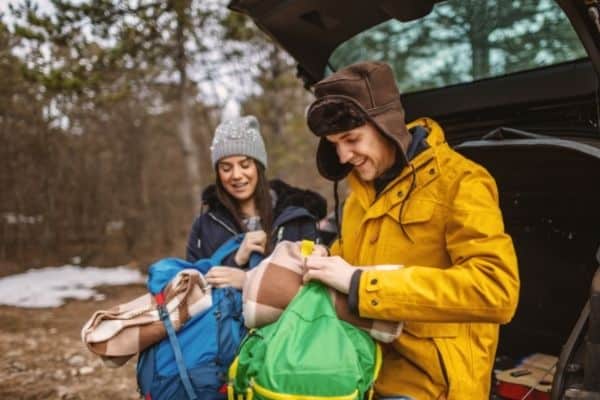
Learn Some Basic First Aid Techniques
While you should always have a small first aid kit in your backpack, you also need to know how to use it.
Before hitting the trail, familiarize yourself with all the components in the kit so you can use them if you’re in a pinch. It can also help you treat injuries on yourself or someone in your group much more quicker.
Make sure you get a first aid kit with bandaids, antibiotic ointment, tweezers, gauze, and scissors. Some basic painkillers and antihistamines are also a good idea.
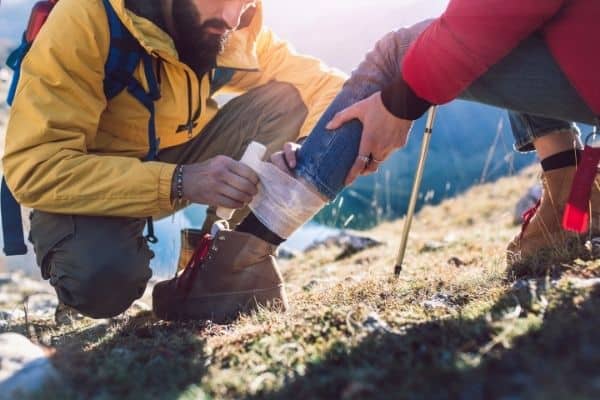
Don’t Forget Your Phone
Some hikers choose not to bring their phones when they hike because they want to detach from the world for a while. As a new hiker, though, this isn’t the best idea.
You never know when you might need help or when you need to call someone or ask for advice. Bringing your phone is especially important if you decide to hike solo.
Your phone is also a nice addition to your hike if you want to take some photos along the way.
Getting Ready For Your First Hike
Hiking with the wrong gear or no gear can drastically change your experience. If you have the wrong shoes or an uncomfortable daypack, you will for sure be less likely to hit the trails again.
Do yourself a favor, and make sure to always bring the essentials with you! It will ensure your experience is much more enjoyable. You’ll also look like a pro even though you’re just starting out.
Here are the steps to take before hitting the trails for the first time.
Buy the Right Daypack
Your daypack will be your new best friend when you’re hiking. You should buy one specifically made for hiking. Don’t just use a regular or fashion backpack. The right hiking gear for beginners is very important because it can make you fall in love with hiking or make you hate it.
Good daypacks will have straps to buckle around your waist and your chest that help distribute weight to make it more comfortable to carry. There should also be sleeves on the side to hold water bottles for easy access.
The best daypacks will also have a mix of large compartments and small compartments. You can keep heavy items closer to your back in the largest compartments. Snacks and smaller items can be better organized in the little pockets.
You can also consider getting a hydration backpack with a water pouch. This keeps you from having to bring along several bottles of water and makes it easier for you to access water through a tube.
Make sure to still choose an option with small compartments for snacks and your phone that are easy to access. Even if a hiking pack has a large pouch, there should be small compartments on the outside.
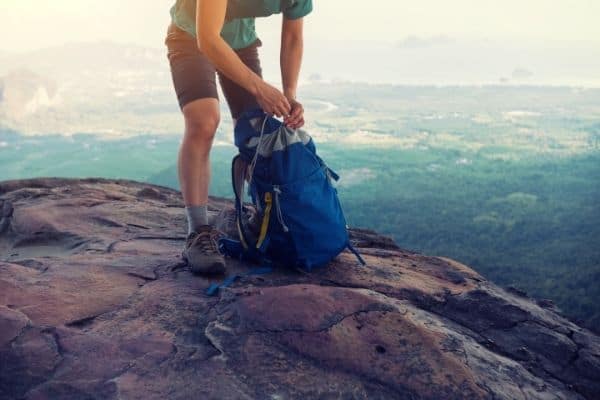
Choose a Good Shoe/Sock Combination
Shoes that don’t fit properly or that give you blisters will ruin a hike. Before setting out, you need to get proper hiking shoes or boots.
Hiking boots will usually go over your ankle or around your ankles. Shoes will look just like normal sneakers or tennis shoes but with better tread.
No matter what model you choose, try to get a pair with solid grips on the bottom. This will keep you from falling and slipping. If you see Vibram on a pair of hiking shoes, you know it has this.
Boots are better if you need ankle support and are going for longer hikes. Shoes tend to be more fashionable and multi-purpose, so you don’t need to change out them if you’re going to lunch or for drinks afterward.
Socks are just as important as shoes. For winter hikes, you might want to get thick socks or wool socks. For summer hikes, you’ll need breathable socks.
No matter the season though, the socks need to have enough padding to keep you from getting blisters. Some socks even have shock absorption and added sole support.
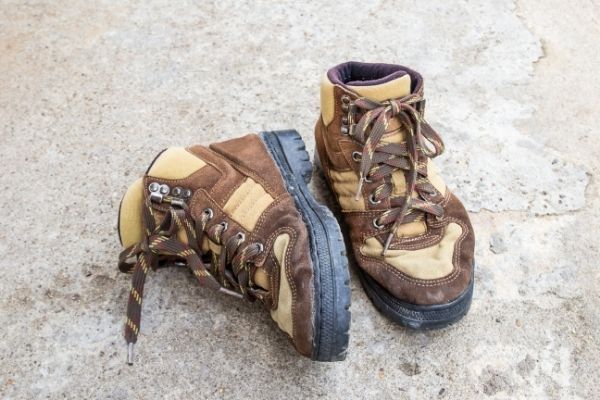
Know the Most Popular Hiking Brands
If you’re stuck trying to find gear, you can always go for the most popular brands. They usually have excellent quality items.
The best hiking gear for beginners includes things from these brands:
- REI
- Osprey
- Patagonia
- Black Diamond
- North Face
- Columbia
- Wild Country
- Big Agnes
- Mountain Hardware
Hiking for Beginners—Terminology to Know
When researching trails around the United States and hiking for the first time, you might run across some words and terms that sound unfamiliar. Check out these most common terms that will come in handy for hiking for beginners:
- All-Access: These trails are suitable for all ages and fitness levels. They are also often stroller and wheelchair-accessible, depending on the terrain.
- Base Weight: The total weight of your backpack, including all of your gear. For small day hikes, you’ll want to keep it under 10 pounds.
- Loop Trails: These trails will take you through a loop, so you never turn around. Once you reach the end of the loop, you will be back where you started.
- LNT: This is a common acronym you might see on hiking signs and on hiking blogs. It stands for Leave No Trace. When hiking, you want to make sure you leave the trail as pristine as you found it. This means no littering and taking care of the environment.
- Out and Back Trails: These trails will take you all the way to the end of the trail until you reach a sign with the last mile marker. You will then turn around and hike the same section to get back to your starting point.
- Section Hike: This is when you do one small section of a hike instead of the entire trail. This is a great option for beginners.
- Thru-Hike: If someone is doing a thru-hike, they are hiking a long and difficult trail all on one go.
- Trailhead: this is the very starting point of the trail and is usually marked with a sign. It’s also where you might park, depending on whether the trail has a designated parking lot or not.
- Tread: This is something you need to look for on the bottom of hiking boots or shoes. Having decent tread will make sure you don’t slip on wet or muddy terrain.
- Walk-Up: a walk-up mountain or trail means you can summit the mountain peak without ropes or other climbing gear.
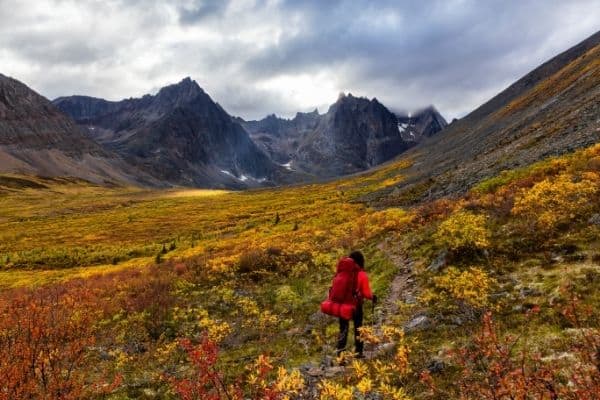
Hiking for Beginners—Ready for Your First Hike?
This guide and tips have prepared you for setting out on the trail for the first time. Hiking is a fantastic way to exercise and explore your local city and state. It’s also a great pastime while on vacation and can give you a unique opportunity to explore a new place.
Are you planning to hike for the first time? What are you most excited about? If you’re an experienced hiker, what tips or recommendations do you share for hiking for beginners?
You Might Also Like
- Best Women’s Hiking Shoes Under $150
- Hiking with a Dog—Top Tips for Safety and Fun
- The 26 Best Hikes in the US
- 6 Best Men’s Hiking Shoes Under $150 (2022 Buyer’s Guide)
Like it? Pin it!
